- Home
- Michael Wolff
Burn Rate Page 9
Burn Rate Read online
Page 9
Machinist took notes with a fountain pen on a leather card holder with specially engraved card stock, which he scrutinized now for a moment. “If we led the mezz round,”—he pulled down on his cheeks—“we’d want to come in with a package of warrants giving us five percent at a strike price at the level of your last round. Where was that?”
“At twenty-seven million.”
“This would be in the combined enterprise. And five percent of the total raised for the mezz.”
“Of course,” Hayden said.
This meant that for inserting themselves at this juncture, the Patricof firm would receive, in addition to what it would receive from its ownership of our shares and for no cash outlay, 5 percent of the value of the combined companies over $27 million. At the Lehman valuation of $150 million, Patricof had just earned $6.15 million. If we did indeed double the value with a combination of the two companies, then Machinist had just earned $12.3 million. Oh yes, and plus 5 percent of the $7.5 million to be raised in the mezz round.
“It’s Monday,” Machinist said, looking at his watch. “Why don’t we meet on Wednesday? At your office. Perhaps the principals should spend some time together before that.”
“Why don’t you come for dinner tomorrow?” Hayden said to me.
“Great,” I said, pretending ease with the coast-to-coast time–space nonchalance. “You’re in town or on the Peninsula?”
“We’re actually in Sausalito. We’re right on the water. It’s fabulous. You’ll love it.”
“Cool.” I smiled broadly, if dazedly, too. In the course of a few hours, a plan had been put in place to make me one of the richest men in the country, partner me with one of the most blackened business names of the century, and fly me to dinner across the continent.
“We’ve just turned this pile-of-shit company of yours into one hundred and fifty million dollars,” said Machinist after Hayden left. “I’m going down in banker history.”
“Honestly, I am somewhat concerned about the Maxwells,” I said.
“Trust me, we’re going to get them out of this before we’re finished. We’re going to squeeze them out. They’re gone.”
“How is he going to get rid of them?” Alison asked when I came back from the meeting.
“We’re going to squeeze them out.”
“How?”
“The deal. In the deal.”
“Every time you go over to Patricof, you come back in a—what do they put in the water there? They charge you for the water, by the way.”
It was true that when you reconstructed the specifics of conversations with Machinist, you often could not find the bridges by which we’d crossed these large chasms to great fortune. It was also true that they charged client companies for the meals.
“It isn’t Bob who has to work with these people. It’s going to be you. It’s not even that you don’t know who they are. You know who they are. These are the Maxwells. The Maxwells! Hello? Robert Maxwell?”
“I know that. But—”
“They have a company on the West Coast which loses a fortune. You have a company on the East Coast which loses a fortune. So bringing them together . . . does what again? Adds, for the hell of it, geographic complexity?”
“I don’t think you understand the larger picture. What you have here, what we have the opportunity to bring together here, is a strategic vision. Obviously, these aren’t mature companies. If they were, we wouldn’t have this opportunity. But you’ve heard of being in the right time and the right place? I really think there’s a chance that we can make two plus two equal five here. Really.”
“You realize that because you’re flying at such short notice that ticket is going to cost over eleven hundred dollars?”
“How small-time can you be?”
I checked into my usual hotel in San Francisco, an establishment catering to businessmen needing over-the-top pampering. My trips to the West Coast had become so frequent that the hotel had set me on a spiral of upgrades that had lately put me in a suite of rooms larger and certainly more lavish than my apartment in New York.
Regretfully, I asked to be downgraded this time. I thought that the Patricof boys, and Jon Rubin with his technology advisor, all soon to join me, might raise an eyebrow at my rock-star-like accommodations.
It was midnight, at least it was for me on New York time, before I met Hayden and party for dinner at a downtown restaurant.
Whereas in the rest of the country the Internet was still obtuse and odd, in San Francisco restaurants the murmur was a rich stew of words like “Java,” “ubiquity,” “search sentence,” “economic model,” “registered user,” “banner ad.” I wondered how many other mergers and alliances and consolidations were being planned in this restaurant this evening.
Our party included Hayden; his wife, Isabel Maxwell; the Magellan marketing VP, Cindy Martin, a young woman with a soft southern accent; the square-faced CFO, a fraternity type; and the chief technology officer, a small man who looked his part.
Isabel Maxwell sat at my right. At forty-five, she was an intelligent and somber-looking woman, plainly dressed, who seemed to me more like someone you might meet in an academic setting. There was something hair shirt about her. Maybe to her credit. She probably could have lived like exiled royalty, drifting through the world’s pleasure spots, but here she was trying to build a business from ground zero like the rest of us, and working like a dog. Perhaps there had been some distance between father and children, or at least between father and daughters, to have created in them a technology-business work ethic.
But as soon as I turned to her, she asked, “Did you know my father?”
In a way, I was flattered to be included at the level of people who would have known Robert Maxwell. But when I realized I was struggling to have a respectful conversation about him, I wished she’d pretended to be just another Internet entrepreneur.
“He was a visionary,” she said.
“Yes.” I nodded.
“He knew what was happening with information.”
“He did.” My head wouldn’t stop nodding.
“I wish you had known him.”
“I really, really would have liked to have known him.”
Perhaps she was making the best of it. I’m sure in therapy they would say she was avoiding denial. It was, however, slightly disconcerting to be reminded that it was Robert Maxwell’s children who were losing nearly a million dollars a month of someone else’s money.
I turned to the others at the table. It was interesting to meet the competition. Through the modern miracle of mergers and acquisitions, parallel lives are revealed.
“What I’m really dying to know is how you did that AT&T deal,” I said.
David Hayden looked across the table at the demure Cindy Martin, the marketing VP.
“It was Cindy’s deal,” he said.
“I don’t know how you got those guys to make a decision. Unbelievable. They were like Soviet bureaucrats. Not even. Albanian bureaucrats.”
It was an Internet industry subplot, how the “telcos” had failed to understand what was going on with the Internet.
Once, I had been driven out to the AT&T headquarters—the kind of structure that might be erected in an oil-rich one-party state—in Basking Ridge, New Jersey, to talk about the Internet. In a large linoleum Pentagon-style conference room, the AT&T Internet commissars struggled to explain the world’s largest communication company’s Internet strategy. By the end of the meeting, we were left with a nutty professor’s blackboard covered in intricate formulations and Venn diagrams. Crazier still, they tried to implement this plan. The upshot was a series of expensive and hopeless initiatives, all of which would finally be abandoned in favor of a simple dial-up Internet service. One of the ideas was that AT&T would create the ultimate navigational system for the Net, which, they suggested, could be my deus ex machina to unbelievable fortune (that week’s deus ex machina, anyway). “You can make a penny a day from each of our eighty million c
ustomers,” said a generous AT&T executive. “If, if, you can create a product that can habituate the customer!”
“I can! I will! Yes!” I had said, rolling over in my mind this word: “habituate.”
But then, suddenly, as we exchanged deal memos and contracts, the deal was pulled away, lost. Gone. Puff. Magellan, in a deal announced at a news conference held at Radio City Music Hall, had emerged the winner.
“You did an incredible job, getting those guys to do the deal. Really, wow!” I said to Cindy Martin.
“No,” Hayden said softly, with a slightly embarrassed smile. “It was Cindy’s deal at AT&T. Cindy was working in New Jersey. Cindy was at AT&T. We hired her after we did the deal.”
Damn. There it was. Clearly, I hadn’t done what you’re supposed to do: embrace the executive on the other side, draw them in, make them part of your team. Surely, that’s business. I was kicking myself. Obviously, I deserved to lose.
“Wow,” I said.
Everyone laughed in a we’re-on-the-same-team-now sort of way.
“Cindy,” Hayden said, “is perhaps one of the most brilliant marketing executives in the Internet business. Really. She’s one of our critical assets.”
He gives credit, I thought. Good. I liked that.
In her Southern voice, breathy but firm, Cindy said, “I think it’s incredibly exciting that discussions seem to be going so well. We are really about to put something together that is going to mark a fork in the road for this industry. Our deal will change everyone’s thinking.”
“The depth of our two organizations, together with the strategic support of Patricof, means that we become the team to beat,” said Hayden proudly.
“It’s probably too early,” said Cindy, almost blushing, “but I’d like to offer a toast.” She raised her glass. “To a very productive discussion tomorrow—”
“And a speedy one, too,” Hayden said.
“Yes,” I said, raising my glass, willing to accept the spirit.
“It is important,” Hayden said, “that if we’re going to do it, we do it. We don’t want this to drag on and on.”
The hotel limo took me the next morning over the Golden Gate Bridge into Marin County and down the hills into the fog of Sausalito. Surely, when you build in your mind the ultimate entrepreneurial fantasy, that relaxed and fulfilling and profitable business, you locate it here.
This was much better than the office parks of Silicon Valley (as a taste issue, Silicon Valley is not appreciably more with-it than New Jersey). You could look out over the water. You could hear the gulls. What more was required?
There was a white-shirt-sleeves-rolled-up meeting going on in the glass conference room off of the reception area when I arrived.
“Our CFO is going over the mezz round papers with Ameritech,” Hayden said. “I wanted to show you around and get you going with a few people first before I go into the meeting.”
That was the day. I would visit with the various executives in my position as the new . . . what? Boss. The new Boss. I would be trying to get a sense of what was amiss in the operation. I would be looking for telltale signs of . . . what? I thought, I have to adjust to this role . . .
Then at about 4:00, Jon Rubin and his technology advisor would arrive. Rubin would meet with Hayden, and the technology advisor would meet with Magellan’s technology chief. Machinist and his factotum would arrive then for a dinner affair, a gala-ish gathering: dinner for twenty or so in the wine cellar of a celebrated San Francisco restaurant.
Certainly, the Maxwells knew how to do a deal.
The economic premise of Magellan’s business was not terribly different from every other Internet business: Spend now for what will come in the future. The only difference was one of extreme. Magellan was losing money at a top-of-the-industry rate.
Magellan’s staff was almost twice the size of ours. Their salaries were real moneymaking-business salaries. Indeed, the only eyebrow I had seen Bob Machinist raise so far in the deal was directed at the large outflow of cash to Hayden and the Maxwell sisters.
Otherwise, Machinist seemed to accept the economic premise. I was starting to appreciate that he liked the lever of the Magellan losses. To date, we had lost $3 million or so; Magellan had lost $10 million or thereabouts. So, we were buying our 50 percent for two-thirds less than Magellan was buying its 50 percent. That somehow seemed to make sense.
It was a marvelously well-heeled everything-right-with-the-world evening.
The ambiance and organization and attention to detail and, no doubt, the price tag of the evening were at quite a distance from our mutual hemorrhage of cash.
Machinist was in a good mood. Expansive. He was in a deal now with Peter Guber, the free-spending former chairman of Sony Pictures and legendary Hollywood dealmeister. In one of those investment banking all-in-the-family stories, it had been Jon Rubin’s uncle, Mickey Schulhof, who, as the president of Sony America, had backed Peter Guber’s wild excesses at Sony. Guber had been fired from Sony Pictures but, with the backing of Schulhof and the promise of a few hundred million more from Sony, had started a new company called Mandalay Pictures. Guber, in the spirit of the surge in cross-media deals, had recently brought in Machinist and the Patricof organization to help him buy a major book publishing company. Machinist, who had come to San Francisco fresh from doing Mandalay business, was already thinking maybe we wouldn’t do an IPO after all, maybe our company merged with Magellan would make the perfect new media acquisition for Guber and Mandalay and Sony’s ever-flowing torrent of overvalued investments.
Machinist was in a there’s-no-way-to-lose mood.
The long, rustic-style table was set in a private room that doubled as the restaurant’s wine cellar and evoked Tuscany, a favorite San Francisco theme. The various courses flowed with mock-Italian abundance.
There was no real business discussed, beyond gossiping back and forth about Internet companies and the investors who funded them. It was an evening for socializing, for cementing a compact, for hurriedly building a foundation of trust and bonhomie. We had all become friends, cohorts, partners. I was learning.
Machinist held court at one end of the table. His presence was large enough to hold the attention of at least half of the unwieldy group. It was a great performance. You felt, couldn’t help feeling, that there was a leader at the table. And that the deal, this highly complex and fragile process, had a leader with the gifts and prowess and wisdom, even, to guide us to where we all wanted to go. You naturally yielded to him. You were pleased to yield. In fact, it was hard not to turn to jelly.
All this was working fine—we felt like a team, it felt like a done deal—until Christine Maxwell, the other Maxwell twin daughter and the real founder of the company, made her entrance halfway through the evening. She had flown in from France, coming to the restaurant directly from the airport. Here, I thought, was the genetic thing at work. She was much more commanding than her sister. Isabel Maxwell seemed fragile, thoughtful. Christine seemed alarmingly solid and beyond reproof. Matronly, but in the way of a royal. She went to the exact center of the table, the fulcrum spot, which at that point was occupied by Jon Rubin’s technology advisor, and said to him, “It would be helpful if I could take that seat; perhaps you could find another.”
Christine Maxwell addressed Machinist over the heads of everyone else. She questioned him now with hauteur and specificity as to the terms of the Patricof commitment to a Magellan deal. In so many words, she indicated she was still quite a ways from making up her mind about doing a deal with us and with Patricof.
“Christine,” David Hayden said.
“I’m sorry, David,” she said regally, “I think we should know—”
“Christine, why don’t I fill you in later on where we are in the overall discussion.”
“Of course, David. You must fill me in.” But she turned back to Machinist and persisted in questioning him as though she were a prospective investor in the Patricof funds, rather than a potential investment
of them.
There was a kind of mask that crept over Machinist’s face that allowed him to remain unfailingly polite with her but at the same time expressed to his particular circle, in which I was included, that this woman was history.
The evening wore on, and on, past several less and less reasonable hours, with ever more food and drink until finally, blissfully, Christine Maxwell rose in a manner to indicate everyone else should rise, too, and said, “This has been an enjoyable evening. Thank you all for coming. I look forward to making progress on our discussions tomorrow.”
What I want to know is, How do these people, these business combatants, these financial warriors, come by the wherewithal, what with late nights, jet lag, and strange beds, to get up so cheerily the next morning?
There they were—Machinist, the factotum, the technology advisor—sitting by their luggage with their briefcases propped open and their cell phones working, in the lobby by 7:30 the next morning.
“Ready to get ’em?” the factotum asked, grinning.
I could barely even smile to this.
The technology advisor was in the lobby, too, but not Jon Rubin, who would—a message had been left—join us later. Maybe, I thought, this means that if you are really rich you can sleep in.
“I’m ready to stay if we have to,” Machinist said. “But I want to check out. I want it to look like we have no intention of staying. I’d like to get the six o’clock flight. If we have to, we’ll get the red-eye. And we want a deal by then.”
“Oh, the red-eye,” I said, exhausted at the thought.
Machinist gave instructions for the factotum to give instructions to get us seats on all flights to New York.
In the hotel limo we crossed the bridge and descended down through the fog into Sausalito again.
There was an hour of preliminaries—of securing the conference room, of phone calls that had to be made back to New York, of a tour of the premises for Machinist and the factotum, and of gathering most of the same people from the night before into a large conference room to begin the formal negotiation.

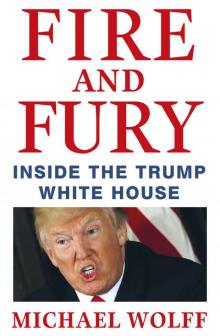 Fire and Fury
Fire and Fury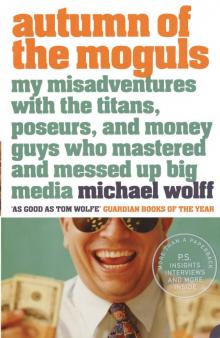 Autumn of the Moguls
Autumn of the Moguls Sefiros Eishi: Chased By War (The Smoke and Mirrors Saga Book 2)
Sefiros Eishi: Chased By War (The Smoke and Mirrors Saga Book 2) Sefiros Eishi: Chased By Flame
Sefiros Eishi: Chased By Flame Chased By War
Chased By War Chased By Flame
Chased By Flame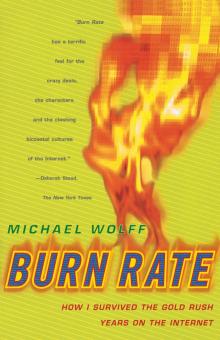 Burn Rate
Burn Rate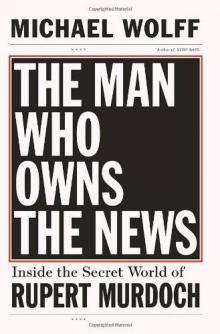 The Man Who Owns the News: Inside the Secret World of Rupert Murdoch
The Man Who Owns the News: Inside the Secret World of Rupert Murdoch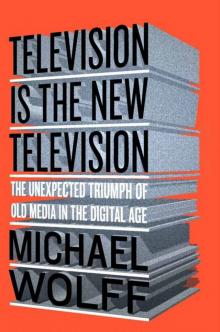 Television Is the New Television
Television Is the New Television